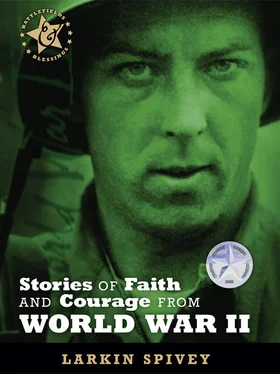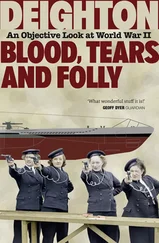Across the Atlantic, sensing this new spirit of defiance in the people and government of Great Britain, The New York Times proclaimed:
So long as the English tongue survives, the word Dunkirk will be spoken with reverence. In that harbour… at the end of a lost battle, the rags and blemishes that had hidden the soul of democracy fell away. There, beaten but unconquered, in shining splendour, she faced the enemy, this shining thing in the souls of free men which Hitler cannot command… It is the future. It is victory. 27
But I call to God, and the Lord saves me. Evening, morning and noon I cry out in distress, and he hears my voice. He ransoms me unharmed from the battle waged against me.
—Psalm 55:16–18
An American bishop asked an Englishman after the war, “How did you British survive that period during World War II between Dunkirk and the coming of the American personnel and supplies?” John Marsh, the principal of Mansfield College in Oxford, replied:
We had Winnie [Winston Churchill]. Those speeches of his in the House of Commons were worth a million men to us. What he said compelled us by his persuasion to believe. He said that no matter what happened, we were going to win. He said, we were on the side that was going to prevail… we were going to win. There was no doubt about that. 28
It may be difficult to quantify Winston Churchill’s contribution to the war effort, but there is no doubt that his moral leadership was pivotal. There was an Old Testament leader who also had to help his nation overcome seemingly insurmountable odds. King Asa was the third king of Judah and was known as a man of great integrity. During his reign he instituted a moral revival and a renewal in purity of worship to God. When his country was invaded by a vast Ethiopian army, he was also able to inspire his troops by ensuring them that they were on the “right side.” He placed himself and his kingdom under God’s providential care and, through his faithfulness, led his nation to a great victory.
Then Asa called to the Lord his God and said, “Lord, there is no one like you to help the powerless against the mighty. Help us, O Lord our God, for we rely on you, and in your name we have come against this vast army. O Lord, you are our God; do not let man prevail against you.”
—2 Chronicles 14:11
January 18
Prayer on the Beach
As the British Expeditionary Force retreated toward Dunkirk, the Green Howards Regiment was part of the rear guard fighting to delay the German advance. This unit, like many others, had endured days and nights of constant action, and every man was bone tired, hungry, and anxious. On May 29 orders finally came for withdrawal to the evacuation beaches. A Green Howards rifleman described what he saw:
We looked a sorry sight, covered with dirt and grime with hunger gnawing at our bellies. The going was hard, the sand being so soft and deep. Thousands of men were forming queues leading down to the sea and were in the water up to their shoulders, doing their utmost to get onto one of the small boats, which very often capsized. Beachmasters had a very difficult task keeping some semblance of order, but by and large the lads just waited patiently for their turn to come until the planes came over. Those in the water just ignored the bombs where could they run? I saw some poor lads crying and others, on their knees, praying. In the prevailing mood of many of the men it was common to see groups of soldiers being led by a Padre, in prayer. 29
Many men were reassured and comforted on the beaches of Dunkirk as they turned to God both individually and in small groups. In the midst of this chaotic and dangerous ordeal these soldiers were able to go to a quiet place inside, where God always waits. We don’t know how each prayer was answered, but we do know that each man was touched in some way and strengthened by God’s presence. This is God’s promise to each of us: if we call out to him, he will listen, and he will be there for us in every crisis.
Let us then approach the throne of grace with confidence, so that we may receive mercy and find grace to help us in our time of need.
—Hebrews 4:16
January 19
Calm in the Storm
Twenty-one-year-old Pilot Officer John Beard was flying his Hurricane fighter at 15,000 feet, waiting for an attacking formation of enemy bombers and fighters to appear. Suddenly, his flight leader called out that he had them in sight. From a distance the other aircraft seemed like an unusual cloud formation, at first quite beautiful. Then, as they drew closer, the details began to stand out:
I could see the bright yellow noses of Messerschmitt fighters sandwiching the bombers, and could even pick out some of the types. The sky seemed full of them, packed in layers thousands of feet deep. They came on steadily, wavering up and down along the horizon. “Oh, golly,” I thought, “golly, golly…”
And then any tension I had felt on the way suddenly left me. I was elated but very calm. I leaned over and switched on my reflector sight, flicked the catch on the gun button from “Safe” to “Fire,” and lowered my seat till the circle and dot on the reflector sight shone darkly red in front of my eyes.
The squadron leader’s voice came through the earphones, giving tactical orders. We swung round in a great circle to attack on their beam into the thick of them. Then, on the order, down we went. I took my hand from the throttle lever so as to get both hands on the stick, and my thumb played neatly across the gun button. You have to steady a fighter just as you have to steady a rifle before you fire it. 30
I doubt that all pilots were so calm going into combat. But it is surely a priceless ability to be able to quiet oneself in the midst of chaos. Some are able to accomplish this through the force of their own will power. Whether you and I have that capability is an interesting question. Fortunately, we know that we don’t have to rely on our own resources in times of trouble. Christians are blessed with knowledge of the sure path to inner tranquility in all situations. When we place our trust in Jesus Christ, we are assured of the most lasting and perfect peace possible to human beings.
And the peace of God, which transcends all understanding, will guard your hearts and your minds in Christ Jesus.
—Philippians 4:7
John Beard found himself in the midst of a swirling melee of fighters and bombers. At one point a German Dornier 17 flew across his path followed by a pursuing Hurricane. Behind the Hurricane came two Messerschmitts. With a kick of his rudder he lined up on the German fighters, thumbed his gun button, and opened fire.
The first burst was placed just the right distance ahead of the leading Messerschmitt. He ran slap into it and he simply came to pieces in the air. His companion, with one of the speediest and most brilliant ‘get outs’ I have ever seen, went right away in a half Immelmann turn. I missed him completely.
At that moment some instinct made me glance up at my rear-view mirror and spot two Messerschmitts closing in on my tail. Instantly I hauled back on the stick and streaked upward. And just in time. For as I flicked into the climb, I saw, the tracer streaks pass beneath me. 31
Checking his cockpit, Beard saw that his fuel supply and ammunition were low. He knew that he couldn’t take on two enemy fighters. At that point, however, the Messerschmitts broke off their attack and turned for home. A flood of relief washed over him as he put his nose down and did the same thing.
A religious person might attribute this flash of “instinct” to God’s saving grace. A skeptic would undoubtedly chalk it up to good luck. As a former skeptic I can understand the latter attitude. In thinking about my experiences in combat, I have wondered about the amazing extent of my own good luck. Did God intervene on my behalf? I can’t prove it to a skeptic, but I believe earnestly that he did. I thank God daily for watching over me in the past and for keeping my family and me safe through all the dangers we face now. The question for me is no longer Has God saved me? but Why has he done so? And what should I be doing in response to this amazing grace?
Читать дальше












